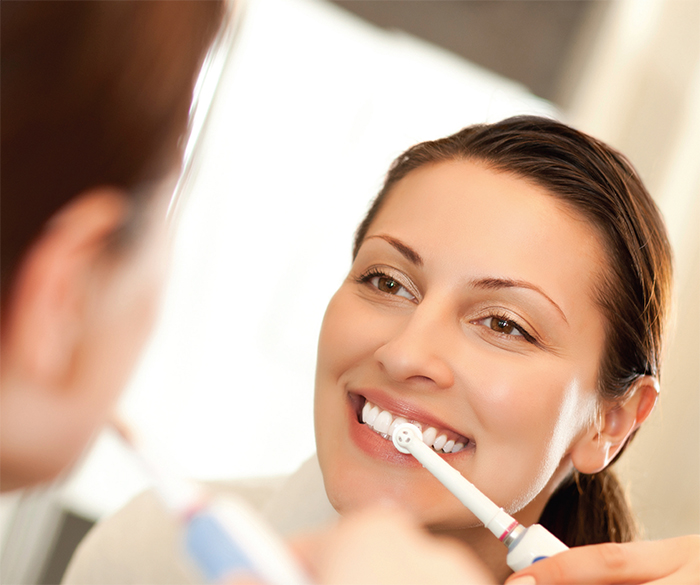A healthier smile
In Conditions
Follow this topic
Bookmark
Record learning outcomes
Despite huge advances in oral care over the last 30 years, our dental health still has room for improvement. We list the most prevalent problems in the UK and the ways in which pharmacy staff can help

Our dental health in the UK has greatly improved in the last 30 years, thanks to fluoride toothpastes, better dental treatment and improved oral hygiene. However, this doesn't mean we can be complacent about our teeth.
Decay in children and gum disease in adults are two of the most prevalent dental problems in the UK. In fact, some 27.9 per cent of five year olds in England have tooth decay and children from deprived backgrounds experience four times as much decay as other children. The most recent survey of national dental health also found that 83 per cent of adults have some degree of gum disease. With more adults keeping their teeth for longer and living longer, this is set to become an increasing problem.
What is tooth decay?
Decay happens over time when plaque forms on the teeth. The bacteria in the mouth combine with food particles, sugars and saliva to form plaque, which builds up on teeth. When we consume food or drink that's high in carbohydrates (sugary or starchy), the bacteria in plaque turn the carbohydrates into energy and produce acid. The acid in plaque breaks down the tooth enamel (the hard, outer layer of teeth), causing a cavity. Once cavities are formed, plaque and bacteria reach the dentine and eventually the pulp layer of the tooth. Decay is most common in molar teeth as these are harder to clean properly
What increases decay risk?
€Frequent consumption of sugary foods and drinks is the biggest cause of tooth decay in the UK,€ says Dr Nigel Carter, chief executive of the British Dental Health Foundation. €As a nation, we have turned from three meals a day to seven to 10 snack attacks, including constantly sipping sugary drinks, and this may be one reason why improvements in dental health have been slowing down.€
Stop the rot
Worldwide, between 60 and 90 per cent of children have dental caries (decay) and the problem is more prevalent in children from deprived backgrounds. €Pharmacists can help this group of the population by providing appropriate advice on oral hygiene regimes and ranges of affordable toothbrushes and toothpastes,€ says Dr Carter.
At the British Dental Association, scientific advisor Professor Damien Walmsley says: €Any contact that health professionals have with parents is an opportunity to provide advice around the importance of maintaining a good oral hygiene routine.€
Decay is preventable through education and good oral hygiene practice. €Decay is caused by bacteria which ferment sugar in the mouth into acid. There's a need to raise awareness of the relationship between sugars and bacteria and also the issue of hidden sugars in foods and drinks. Encourage your customers to become avid ingredients list readers,€ says Dr Phil Stemmer, dentist and founder of the Teeth for Life practice.
Preventing decay in children
€Pharmacy has a vital role to play in supporting the education that's given in the dental practice by reinforcing healthy eating messages, with a reduction of frequency of sugar consumption, and recommending and providing a range of fluoride toothpaste and toothbrushes suitable for children,€ says Dr Carter. €It's important that children brush twice a day with a fluoride toothpaste containing more than 1000ppm for children under three years and over 1350ppm for children over three,€ he adds.
Professor Walmsley has this advice: €It is important that parents understand that fruit juices and smoothies as well as fizzy drinks and squashes all contain large amounts of sugar and can be highly acidic. Diet drinks should also be consumed in limited quantities as they are also acidic and lead to erosion of tooth enamel, even in the absence of sugar. This is all advice that pharmacy staff can pass on to parents.€
Correct brushing is an essential part of preventing decay and this is something pharmacy staff can advise on too:
- €Don't wet the brush or paste before you start as it dilutes the effectiveness. Brush teeth before breakfast as this coats teeth in fluoride before you eat. Always brush last thing at night and give no fluids afterwards except water,€ says Dr Stemmer
- Replace toothbrushes every two to three months
- Parents should start brushing their child's teeth as soon as first teeth appear
- "Provision of supportive material for parents to encourage development of correct tooth brushing techniques can be valuable,€ says Dr Carter
- €Young children should always be supervised when brushing, to prevent them swallowing too much toothpaste and to ensure they are maintaining correct technique and hygiene,€ says Professor Walmsley.
 Parents should start brushing their child's teeth as soon as first teeth appear
Parents should start brushing their child's teeth as soon as first teeth appear
Decay in children and gum disease in adults are two of the most prevalent dental problems in the UK
Is fluoridation the answer?
Latest research published in the British Dental Journal says the NHS in England could save £4 million in hospital admissions each year to remove decayed teeth if water fluoridation was extended to areas with high levels of decay.
€It's a shocking fact that over 25,000 young people in England last year suffered such poor dental health they had to have teeth removed under general anaesthetic in hospital,€ says Professor Walmsley. €Fluoridation not only reduces the need for this painful and distressing procedure, it can also reduce the dental health gap between children from socially disadvantaged and affluent backgrounds.€
Gum disease €“ the silent epidemic
€Gum disease is becoming more prevalent because we're living longer. It's a largely silent disease and can increase the risk of CHD, stroke, diabetes and arthritis,€ says Dr Stemmer.
Dr Peter Galgut, a periodontist and twice winner of Dentist of the Year, says the nature of gum disease has changed. €Some 20-30 years ago, people used to present with advanced gum disease (pyria) and dentists would remove their teeth and give them dentures. We rarely do that these days. In general, tooth care has greatly improved €“ we have hygienists, dentists have better equipment and we care for our teeth better. However, gum disease is still prevalent as we retain our teeth for longer.€
Spotting gum disease
Gum disease (gingivitis) means inflammation of the gums. It's not usually painful in the early stages, but signs include red, swollen gums and bleeding gums after brushing or flossing.
If untreated, gingivitis advances to periodontitis. Signs of this include:
- Bad breath
- An unpleasant taste
- Loose teeth
- Abscesses under gums
€If gum disease is left untreated, it can lead to tooth loss,€ says Professor Walmsley. €In fact, it is the largest cause of tooth loss in adults.€
€Explain to customers that gum bleeding should be dealt with quickly by their dentist or hygienist and never ignored,€ says Dr Stemmer.
€Your customers need to be aware that gum disease doesn't only affect the mouth, it can affect the immune system too, making them more susceptible to other health conditions. There are links with CHD, preterm birth, bowel cancer and diabetes,€ says Dr Galgut.
Treating and preventing gum disease
Treatment for gum disease will depend on its severity. A professional clean by a dentist or hygienist is often recommended to remove plaque and tartar. In some cases, root planing €“ a deep clean under the gums to remove bacteria €“ may be necessary. A mouthwash containing chlorhexidine may be recommended, too.
Correct brushing is the best way to prevent gum disease, says Dr Galgut. €A regular toothbrush won't get in between teeth, so you need to either floss or use an interdental brush each day too. There are also new toothpastes which contain antiseptics to reduce bacterial count in the mouth and this helps to fight gum disease.€
Tips for a healthy mouth
- Brush teeth twice daily for at least two minutes with a flouride toothpaste
- Floss daily with floss, tape or interdental brushes
- Use a mouthwash to reach areas of the mouth that are missed by brushing and flossing
- Replace toothbrushes and brush heads every three months
- Use a soft-bristled toothbrush
- Don't rinse the mouth after brushing
- Clean the tongue with a toothbrush or tongue scraper
- Eat a healthy diet, avoid sugary foods and don't smoke
- Have a dental check up around every six months.
Denture care
Here are some top tips to pass on to customers who wear dentures:
- Dentures should be cleaned twice daily. Brush with paste and a small to medium head toothbrush before soaking to remove food particles
- Soak dentures in a denture cleaning solution to remove stains and bacteria
- Brush again after soaking
- Always clean dentures over a bowl of water or a folded towel in case you drop them
- It's still important for customers to visit their dentist regularly for check-ups.
